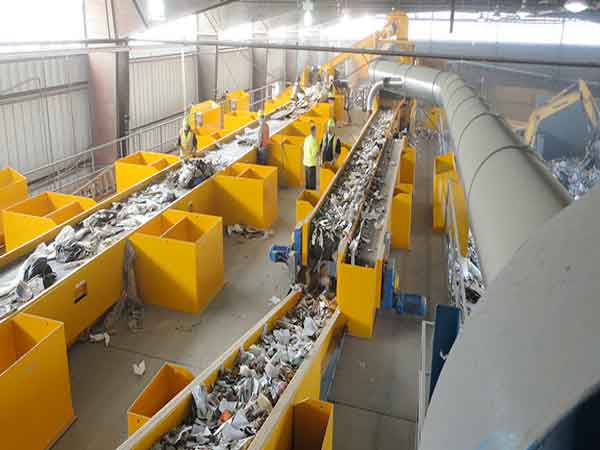Construction is an industry that uses materials unlike any other.
From bricks and mortar through to glass, PVC, and timber, the construction industry uses around 400 million tonnes of materials every single year. And if you think that’s a lot, take a moment to consider that approximately 100 tonnes of this becomes waste. It’s either burnt, sent to landfill, or illegally dumped and it's harming the environment.
As a contractor, waste disposal is part of your job description and it is your responsibility. Proper waste disposal and recycling on the construction site is important and in this article we're going to tell you why.
But first, what exactly can be recycled?
Construction Materials that Can be Recycled
The great thing about construction today is that there are so many materials available - many of which can be recycled. You can purchase everything from composite to steel and recycle any waste that is left over. Below is a list of the most commonly recycled construction materials:
Asphalt
Concrete
Steel
Timber
Glass
Plastics
Paper
Cardboard
Bricks
Plasterboard
Gypsum
Now that you know which construction materials can be recycled, let’s take a look at why it's important.
How Construction Materials Impact the Environment
According to research, the construction industry is responsible for 39% of carbon emissions worldwide. From this figure, 28% is a direct result of energy consumption and 11% from construction materials. The construction industry negatively impacts the environment in the following ways:
Climate Change
Perhaps it goes without saying, but the construction industry is having a significant impact on climate change. The shocking statistic above, highlighting how the construction industry is responsible for 39% of carbon emissions, truly shows how significant the problem is. This is because many of the materials that have been used in construction over the years have been farmed, mined, or sourced from forests.
These are all non-sustainable methods that have (and continue to) have a significant impact on climate change.
Destruction of Natural Habitats
The construction industry plays a big part in the destruction of natural habitats. From the sourcing of materials to the clearing of land, the loss of natural habitats is severely impacting species’ lives.
Carbon Emissions
Another way the construction industry is negatively affecting the environment is through carbon emissions. Not only are many of the materials sourced using non-sustainable methods, they then have to go through the manufacturing process. Manufacturing ensures the materials are ready to be used on the construction site.
However, the manufacturing process is powered by fossil fuels, emitting huge amounts of carbon into the atmosphere and polluting the air. According to The World Health Organisation, there are over 4.2 million deaths each year that have been directly caused by air pollution.
Water Pollution
Just as it does the air, construction is polluting our water. Many construction sites cause run-off into nearby lakes, streams, and rivers. Much of the sediment lying around on construction sites ends up in our waterways.
Some of the most common pollutants include; paints, oils, toxic chemicals, glues, and cement. Having these kinds of materials polluting the water doesn't just impact human lives, but it can have an extremely negative effect on aquatic life.
Landfill Waste
According to the WP Group, “32% of landfill waste comes from the construction industry alone - that’s an estimated 77.4 million tonnes a year.” Construction contributes significantly to the world’s landfill problem, throwing away materials like wood, plastics, concrete, glass, and so much more. Sadly, much of this comes down to laziness. So many of the materials that end up in landfill could have been repurposed or recycled.
The Importance of Recycling in Construction
So, now that you know everything negative about construction and the impact it can have on the environment, let’s take a look at the importance of recycling. Did you know that by recycling construction materials properly, the environmental impact of the construction industry could be significantly reduced. Below are the reasons why recycling in construction is so important.
Look After the Environment
More than ever before, today’s consumers are passionate about looking after the environment. With so many news stories about climate change, habitat loss, and rising sea levels, consumers want to back companies that are taking steps to reduce their climate footprint.
According to Forbes, "As demand for environmental considerations builds, a growing number of investors, and even employees are questioning traditional construction methods and pushing for more sustainable business practices." Recycling construction materials is playing a huge part in this transition towards greener construction practices. It ensures materials don’t end up in landfill or polluting the environment.
Recycling Saves on Costs
If you are looking for ways to reduce your costs, recycling is a cost-effective solution. Not only does recycling save you money on landfill fees, it also negates the need for purchasing new materials. This is particularly helpful at the moment as, due to the pandemic, the construction industry has been dealing with some of the worst material shortages since the war!
Going green will save you time and money in the long-term. Even though the initial purchasing of greener materials may be a little more expensive, you will be investing in a more future-proof business model as the demand for greener practices in construction continues to increase. What’s more, according to How Stuff Works, “Economic analysis shows that recycling can generate three times as much revenue per ton as landfill disposal and almost six times as many jobs.” Not only does recycling save money, it can also make you money, too!
Reduce Energy Use
Prioritising recycling in the construction industry can save tonnes of energy as it reduces the consumption of natural resources. Recycling also reduces the energy usage required to compact construction materials before putting them into landfill.
Recycling Reduces Waste in Landfills
One of the most important reasons for recycling construction materials is that it reduces the amount of waste that ends up in our landfills. This helps reduce our negative impact on the environment and repurpose materials for future use.
According to the European Environment Agency, "Diverting waste away from landfills prevents pollution that can harm our health and the environment. Reducing, reusing and recycling waste can bring economic gains and secure access to critical raw materials. More jobs at higher income levels are also created by recycling than by landfilling or incinerating waste."
Recycling Offers a Competitive Edge
As we have already mentioned, there is an increasing demand for sustainable construction. The definition of sustainable construction, according to The British Assessment Bureau, "means using renewable and recyclable materials when building new structures, as well as reducing energy consumption and waste. The primary goal of sustainable construction is to reduce the industry's impact on the environment."
So, in being proactive with your recycling efforts you will quickly gain a competitive edge. This will help you stand out from the construction companies who aren’t recycling and will, in many cases, make your organisation the more favourable choice.
The importance of recycling in the construction industry cannot be understated. It will literally help shape the future of our planet. We hope the information in this article has encouraged you to consider the changes you could be making on the construction site to reduce your environmental impact. Being proactive and prioritising recycling alone will make a big difference.
Time and date
CONSTRUCTION DIRECTORY
Construction News
15/09/2022
Contractor Responsibility: The Importance Of Recycling In Construction

Latest Construction News
15/11/2024
A significant redevelopment is underway at Royal Naval Air Station (RNAS) Culdrose, Cornwall, following a contract award to Kier and Mott MacDonald. The Defence Infrastructure Organisation (DIO) and the Royal Navy marked the occasion with a contract-signing and ground-breaking ceremony, ...
15/11/2024
JV North, a consortium of housing associations and local authorities, has unveiled a new £500 million procurement framework aimed at delivering over 3,000 affordable homes between 2025 and 2029. The initiative marks a significant boost for social housing and the construction sector. The ...
15/11/2024
Sempra Homes has announced funding approval for a new affordable housing project at Bowers Close on London Road, Pitsea. The development will deliver 31 high-quality homes, offering a mix of rental and shared ownership properties designed to address local housing needs. The project has received ...
15/11/2024
Vistry Group has received planning permission for the first phase of its Wolborough Grange development, which will deliver 94 high-quality homes. This milestone marks the beginning of a transformative project that will provide sustainable housing and significant community benefits in Newton ...
15/11/2024
Salisbury Coach Park and the main footpaths through the Central Car Park have reopened following an extensive transformation by the Environment Agency as part of the River Park scheme. The upgraded facilities aim to provide a more welcoming and comfortable experience for coach passengers visiting ...
15/11/2024
Pennyfarthing Homes has unveiled an exceptional collection of one- and two-bedroom apartments at Oakwood Grove, a modern development offering affordable homes through the Government-backed First Homes scheme, now available via Dorset Council. Located in the scenic rural village of Alderholt, ...
15/11/2024
Morris & Spottiswood Group has acquired part of the collapsed ISG group, offering a vital lifeline to the employees and projects operating within its remit. Absorbing the former ISG Cathedral business, Morris & Spottiswood Group, which is a specialist provider of fitout, refurbishment, M&E, ...
15/11/2024
Morgan Sindall Construction has officially commenced work on Rosherville Church of England Academy, a new primary school designed to address the educational needs of Northfleet’s expanding community. To commemorate the start of the project, a time capsule was ceremonially lowered into the ground, ...
15/11/2024
Vistry Group has exchanged contracts to develop over 200 mixed-tenure homes at Waggons Way, Doncaster. The 16-acre site, formerly part of the Hatfield Colliery, will be transformed into a vibrant new community featuring up to 236 high-quality homes. The proposed development will include homes ...
15/11/2024
The University of Sunderland has officially relaunched its newly refurbished cinema. The venue on St. Peter's Campus was damaged beyond use due to Storm Arwen in 2021, but now a £1.3m investment means it is back in action once again. To mark the occasion, Sir David Bell, the University’s ...

















